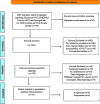Effectiveness of Acupuncture and Acupressure for Improving the Sleep Quality of Menopausal Women: A Meta-Analysis
- PMID: 40224208
- PMCID: PMC11992344
- DOI: 10.30476/ijms.2024.102726.3586
Effectiveness of Acupuncture and Acupressure for Improving the Sleep Quality of Menopausal Women: A Meta-Analysis
Abstract
Background: Various pharmacological and non-pharmacological treatments are utilized to address sleep disorders. This meta-analysis aimed to evaluate the effects of acupuncture and acupressure on enhancing sleep quality in menopausal women.
Methods: A systematic search was conducted using multiple databases, including Scopus, MEDLINE/PubMed, Cochrane CENTRAL, ProQuest, Google Scholar, and Iranian databases (SID, Iranmedex, Magiran) with no date restrictions up to July 2024. Studies published in both Persian and English were included in this meta-analysis. The search utilized keywords such as acupuncture, acupressure, sleep quality, insomnia, menopause, and sleep disorders. A pairwise random-effects meta-analysis was performed to calculate the mean difference (MD) and 95% confidence intervals (95% CIs).
Results: The analyses indicated that both acupuncture and acupressure effectively improved sleep quality in menopausal women. Eight trials with 499 participants demonstrated that acupressure significantly enhanced sleep quality (MD=-2.33, 95% CI=-3.27 to -1.38; I2=94%, P<0.001, n=8). Additionally, six trials with 344 participants showed that acupuncture enhanced sleep quality (MD=-3.47, 95% CI=-5.06 to -1.88; I2=97%, P<0.001, n=6).
Conclusion: The findings revealed that acupressure and acupuncture might improve sleep quality in menopausal women. However, there was a high heterogeneity between studies, and further research is required to confirm the findings of the present study.
Keywords: Acupressure; Acupuncture; Menopause; Meta-analysis; Sleep quality.
Copyright: © Iranian Journal of Medical Sciences.
Conflict of interest statement
None declared.
Figures









Similar articles
-
Association of Acupuncture and Auricular Acupressure With the Improvement of Sleep Disturbances in Cancer Survivors: A Systematic Review and Meta-Analysis.Front Oncol. 2022 May 18;12:856093. doi: 10.3389/fonc.2022.856093. eCollection 2022. Front Oncol. 2022. PMID: 35664757 Free PMC article.
-
Acupuncture and acupressure for premenstrual syndrome.Cochrane Database Syst Rev. 2018 Aug 14;8(8):CD005290. doi: 10.1002/14651858.CD005290.pub2. Cochrane Database Syst Rev. 2018. PMID: 30105749 Free PMC article.
-
Acupuncture or acupressure for pain management during labour.Cochrane Database Syst Rev. 2020 Feb 7;2(2):CD009232. doi: 10.1002/14651858.CD009232.pub2. Cochrane Database Syst Rev. 2020. PMID: 32032444 Free PMC article.
-
Interventions for improving sleep quality in people with chronic kidney disease.Cochrane Database Syst Rev. 2019 May 26;5(5):CD012625. doi: 10.1002/14651858.CD012625.pub2. Cochrane Database Syst Rev. 2019. PMID: 31129916 Free PMC article.
-
The effects of acupuncture versus sham/placebo acupuncture for insomnia: A systematic review and meta-analysis of randomized controlled trials.Complement Ther Clin Pract. 2020 Nov;41:101253. doi: 10.1016/j.ctcp.2020.101253. Epub 2020 Nov 1. Complement Ther Clin Pract. 2020. PMID: 33186824
References
-
- Wang Z, Zhai F, Zhao X, Zhao G, Li N, Zhang F, et al. The efficacy and safety of acupuncture for perimenopausal insomnia: A protocol for a network meta-analysis. Medicine (Baltimore). 2020;99:e23741. doi: 10.1097/MD.0000000000023741. [ PMC Free Article ] - DOI - PMC - PubMed
-
- Samami E, Shahhosseini Z, Elyasi F. The effects of psychological interventions on menopausal hot flashes: A systematic review. Int J Reprod Biomed. 2022;20:255–72. doi: 10.18502/ijrm.v20i4.10898. [ PMC Free Article ] - DOI - PMC - PubMed
-
- Bezerra AG, Pires GN, Andersen ML, Tufik S, Hachul H. Acupuncture to Treat Sleep Disorders in Postmenopausal Women: A Systematic Review. Evid Based Complement Alternat Med. 2015;2015:563236. doi: 10.1155/2015/563236. [ PMC Free Article ] - DOI - PMC - PubMed
-
- Zhao FY, Fu QQ, Kennedy GA, Conduit R, Wu WZ, Zhang WJ, et al. Comparative Utility of Acupuncture and Western Medication in the Management of Perimenopausal Insomnia: A Systematic Review and Meta-Analysis. Evid Based Complement Alternat Med. 2021;2021:5566742. doi: 10.1155/2021/5566742. [ PMC Free Article ] - DOI - PMC - PubMed
Publication types
MeSH terms
LinkOut - more resources
Full Text Sources
Medical
